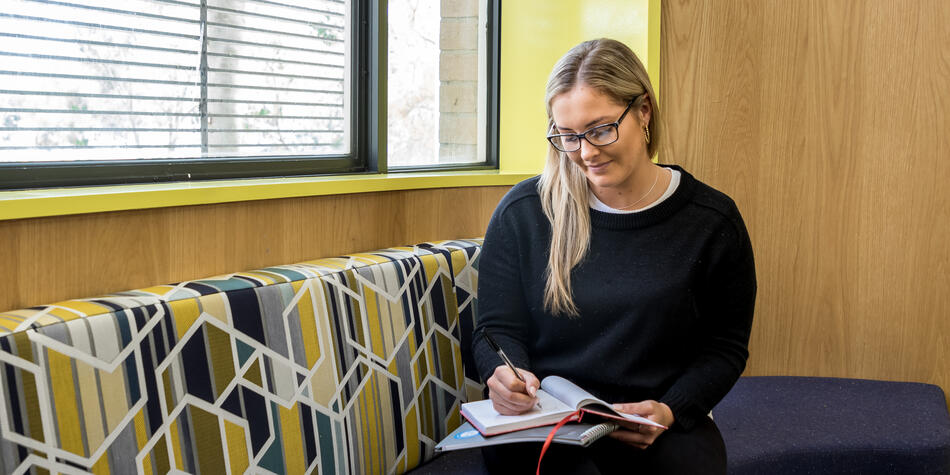While arts degrees are sometimes criticised for being too broad, many graduates reflect on this breadth as one of the key qualities that led them towards their dream career. Whether it’s about keeping options open or pursuing a unique career based on personal interests, a Bachelor of Arts can lead you down unexpected paths.
So what can you do with a Bachelor of Arts? The possibilities are endless. We spoke to two arts graduates who are using their arts degree as a foundation for career success.
Critical thinking with an international focus
Vanessa Smith, a junior analyst for political risk and strategic advisory firm Dragoman, credits her time at Deakin for setting her up with the key skills she’s using daily.
‘Undertaking an arts degree allowed me to think critically across a number of different fields,’ she says. ‘For me that was the areas of history, international relations and Middle East studies. The degree also taught me project management skills, in being able to plan and execute multiple tasks within the given timeframes.’
In her current role, Vanessa investigates and evaluates business opportunities in Australasia, Southeast Asia, Africa and the Middle East. This sees her writing briefs, strategies and country-specific reports that assess both commercial opportunities and political risk for companies.
‘A career highlight was being selected in 2017 to participate in the Bard College Globalisation and International Affairs Programme in New York City,’ Vanessa says. ‘I also had the excellent opportunity to intern at Oxford Analytica, a global analysis and advisory firm.’
It was during this internship where Vanessa’s interest in foreign affairs deepened, especially around the idea of harnessing academic knowledge to assist businesses to navigate political and commercial risk within a global context.
‘I had the privilege during the programme of being able to visit the United Nations Headquarters and to speak to various United Nations representatives about the functioning role the global organisation has to play within the twenty-first century,’ she says.
Renowned problem solving skills
Tyron Paspa, also a Deakin arts graduate, is currently working as manager of asset management reform implementation in the Victorian School Building Authority.
‘Over the last three or four years I’ve chosen to specialise in infrastructure and facilities,’ he says. ‘I have done quite a bit of training and on-the-job skill development to do this role.’
When studying the Bachelor of Arts at Deakin, Tyron majored in Indonesian language and political theory.
‘I ended up doing my honours in political theory but I managed to tie my thesis in to the Indonesian language part of my degree by using Indonesia as a case study,’ Tyron says. ‘That was a very useful tool and that served me really well in creating some relationships in Indonesia.’
Tyron followed his interests without knowing exactly where they would lead. ‘This role is something I would never have considered when I was coming out of Deakin,’ he says. ‘The good thing about doing the arts degree and certainly the honours degree was that you’re so generalist that you can take your career in any direction you want to.’
Tyron sees a strong problem solving acumen as something common to Deakin arts graduates. ‘The main thing I’ve taken out of my Deakin degree is that ability to just look at a problem, apply an economics view, a political theory view and just generally a problem solving view to get different solutions that may not be immediately apparent,’ he says.
‘It’s something that has really served me well in my public service career. I am known as a really good strong problem solver and I’ve been asked to do several really difficult, high-risk, high-value projects because of that reputation.’
A career highlight for Tyron has been his involvement in the past six Victorian State Budgets. ‘Across that period I’ve attracted funding to this department to the effect of around five to six billion dollars,’ he explains. ‘They can become just numbers at the end of the day but if you think about all of the outcomes that have been achieved with that funding it’s quite a significant contribution to the department.’
Tyron’s career so far has been varied and he says, ‘It has been easy to make the transition from one project to another or one problem to another because of that generalist skill base that you get in the Deakin degree.’
A degree that sets you up to choose
Vanessa loves the way an arts degree can be personalised to suit anyone’s needs. ‘A Bachelor of Arts allows you to explore a wide range of topics across multiple fields,’ she says. ‘It has a bit of everything for everyone; from those who have a clear career path direction to those who are not quite sure of what area they would like to study. A Bachelor Arts provides you with the opportunity to tailor-make your course to suit your needs.’
Tyron says that everything you learn in an arts degree falls into place when you start to pursue a career. ‘You’ll come to understand all these different concepts that may seem quite nebulous when you are studying them and writing a 3000-word essay on them,’ he says. ‘In the working environment you can reflect on that and see you’ve learned really valuable skills on how to provide options and attack problems and just get work done.’
Tyron sees an arts degree as the perfect foundation for wherever you may wish to go: ‘I think an arts degree really sets up any career that you are interested in. It gives you such a good base to build from.’
Looking to follow your interests towards a great career? Find out more about the Bachelor of Arts.

